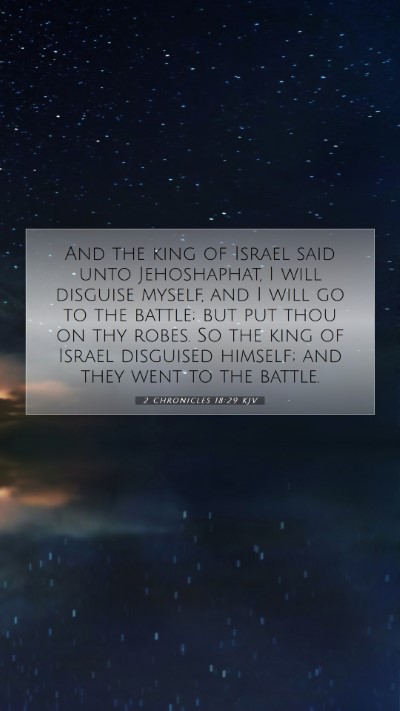Understanding 2 Chronicles 18:29
This verse reads: "And the king of Israel said to Jehoshaphat, 'I will disguise myself and go into battle, but you wear your robes.' So the king of Israel disguised himself, and they went into battle."
Overview: In 2 Chronicles 18:29, King Ahab of Israel is preparing for battle. He conspires with King Jehoshaphat of Judah, suggesting a deceptive tactic of disguising himself while allowing Jehoshaphat to wear royal garments. This scene precedes a critical confrontation where thematic elements of deception, identity, and divine providence are at play.
Bible Verse Meanings and Interpretations
Understanding the meaning of Bible verses, particularly this one, requires examining the historical and theological context. The implications of King Ahab's disguise and Jehoshaphat’s position in the narrative reveal the following:
- Deception in Leadership: Ahab's choice to disguise himself illustrates the treacherous nature of his leadership. Matthew Henry discusses how leaders can resort to deceit, risking the lives of those around them.
- The Role of Jehoshaphat: Jehoshaphat, known for his devotion to God, becomes a pawn in Ahab's plan. This insight is echoed in the commentaries of Albert Barnes, who highlights Jehoshaphat's naivety in forming alliances with such an unprincipled king.
- Symbolism of Clothing: The distinction between Ahab's disguise and Jehoshaphat's royal attire symbolizes the contrasts between righteousness and wickedness, as noted by Adam Clarke.
In-Depth Analysis and Exegesis
Contextual Background: This event occurs shortly before a significant battle against Ramoth-Gilead, which ultimately leads to Ahab’s demise. Understanding the motives of each king provides deeper insight into their characters and decisions.
- A King's Disguise: The idea of disguise underscores themes of fear and manipulation. Ahab is not merely seeking personal safety; he is attempting to sway the course of battle without facing the consequences of his own actions. This action speaks volumes about the moral failings of Ahab's leadership.
- Divine Sovereignty: The narrative also serves as a backdrop for discussions about God’s sovereignty over nations and kings. Ahab’s attempts to manipulate circumstances can be seen as futile in the light of God's overarching plans, as both Henry and Clarke discuss this divine providence in subsequent chapters.
- Lessons for Believers: For contemporary readers, this passage raises questions about integrity and the implications of our alliances. The idea of fitting in through deception versus standing firm in one’s true identity is a relevant theme for Bible study groups today.
Application to Daily Life
When applying the lessons of this verse to modern life, individuals can reflect on the dangerous path of deceit, particularly in leadership roles. Ahab's actions serve as a warning for Christians about the importance of integrity, transparency, and trustworthiness in relationships and responsibilities.
- Integrity in Leadership: Leaders today are called to reflect the character of Christ, living authentically without guile or pretense.
- Beware of Alliances: Engaging with those who promote deception can lead to destructive outcomes, a central theme in many Bible study lessons on wise associations.
- Reflection on Personal Identity: As believers, understanding our identity in Christ can safeguard us against the temptations to disguise our true selves for acceptance or favor.
Related Bible Verses
- 1 Kings 22:30 - A continuation of the events leading to Ahab's downfall.
- 2 Chronicles 19:2 - Jehu’s admonition to Jehoshaphat about his alliance with Ahab.
- Psalm 119:29 - A prayer for truth in the face of deceit.
Conclusion
2 Chronicles 18:29 encapsulates the gravity of political alliances and the moral complexities faced by leaders. By examining the layers of meaning within this scripture, we invite a deeper engagement with the text through biblical exegesis and interpretation, fostering essential Bible study insights. Seeking clarity on meanings of Bible verses like this one not only enriches our understanding but also prepares us to apply these lessons in our daily lives.
For those eager to explore further, connecting with Bible study groups or utilizing online Bible study resources will enhance comprehension of similar passages.


